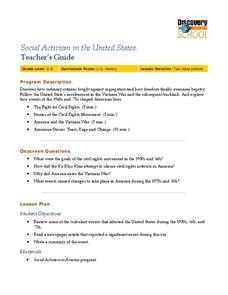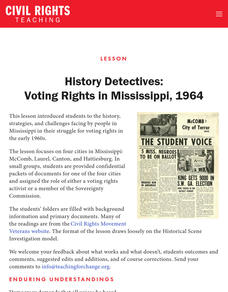PBS
The Meaning of the Fourteenth Amendment
The Fourteenth Amendment was extremely important to civil rights and is a crucial one to remember. The resource teaches about the Supreme Court decisions related to the amendment through writing exercises, reading, and working in small...
Carolina K-12
African Americans in the United States Congress During Reconstruction
The Civil Rights Act of 1866, which granted citizenship to all males in the U.S., resulted in the first African Americans to be elected to Congress. Class members research 11 of these men, the challenges they faced, and craft...
Curated OER
A New Twist on Race Relations
Learners analyze the impact of American Bandstand on race relations. In this race relations instructional activity, students use the music and dance show American Bandstand to learn about race relations. Learners categorize pivotal...
Curated OER
The Civil War and Viet Nam are they Related?
Students identify and explain Civil Rights as they relate to the Civil War and Viet Nam eras. They explore civil rights through literature, artworks, news coverage, video and Internet sites. Students work in a group to develop a concept...
Curated OER
How Music Motivates
Young scholars form conclusions regarding the motivational effects of music on the mind during the Civil Rights era. In this Civil Rights movement lesson, students describe how music motivates, describe the motivational role in freedom...
Curated OER
Social Activism in the United States
Seventh graders explore the goals of the Civil Rights Movement of the 1950s and 1960s. In this US History lesson plan, 7th graders read a newspaper article that reported a significant event during this era. Students write a summary of...
Curated OER
With Liberty and Justice for All
High schoolers examine the role of Supreme Court justices. In this judicial branch lesson, students consider the civil rights and civil liberties as they investigate Minersville School District v. Gobitis (1940) and West Virginia State...
Curated OER
Black Soldiers in the Civil War
Students explain how a history of slavery distinguishes American society from other societies. They study posters and documents from different eras in our history which document the practice of slavery, and civil rights violations.
Curated OER
The Many Faces of Paul Robeson
Students discuss and construct timelines based on the life of author/performer/Civil Right's activist, Paul Robeson. They view photographs of him at various times in his life and discuss the roles he may have been playing at those times.
Curated OER
Letters from the Japanese American Internment
Young scholars explore the concept of Japanese internment. In this Japanese internment lesson, students examine primary sources that enable them to discover what internment camp life was like and its implications, Young scholars write...
Center for Civic Education
In the Shadows, Agents of Change
Most of your learners have probably heard of Martin Luther King, Jr., or Cesar Chavez, but could they also recognize the names of Betty Friedan or Dolores Huerta? Give your learners the opportunity to discover the many accomplishments of...
Teaching for Change
History Detectives: Voting Rights in Mississippi, 1964
Promises made and promise broken. Spies and activists. Voting rights in Mississippi are the focus of a lesson that has class members research the history of the struggle in Mississippi. Learners take on the role of voting rights...
University of California
The Civil War: Final Assessment
Pupils discover the true nature and purpose of the Civil War in the eighth and final installment of an informative series. Using primary and secondary documents, history buffs merge social study knowledge with English skills to create a...
University of California
The Civil War: Effects of the Civil War
Imagine being on the front line of the Civil War —from the front porch of your own house. Scholars use visual evidence from primary and secondary sources to analyze the impact of the Civil War on all Americans. They examine the research...
Curated OER
Introducing Vocabulary
Eleventh graders create a timeline of events. In this vocabulary instructional activity, 11th graders work in groups to create a timeline of major events that occurred during the Civil Rights era. Students present to class then create a...
Roy Rosenzweig Center for History and New Media
Reconstruction
When slavery ended, what did the government do to help African American during Reconstruction? An interesting instructional activity uses primary sources such as newspaper articles to help scholars analyze Reconstruction policies and how...
National First Ladies' Library
Trouble in Little Rock: The Desegregation of Central High School
Middle schoolers study one aspect of the Civil Rights Movement in the United States; the battle over desegregating the public schools. They study the desegregation of Central High School in Little Rock, Arkansas by producing a newspaper,...
Alabama Department of Archives and History
Birmingham, 1963: Spring Jubilation Part 2
The release of Martin Luther King, Jr. from the Birmingham jail, the Children's March, and the bombings of the Gaston Motel and the home of Reverend A.D. King's home. As part of a study of the civil rights movement, class members...
Curated OER
Harriet Tubman: An American Hero
Students explore U.S. history by viewing a Civil Rights video. In this Harriet Tubman lesson, students identify the era in which Tubman fought for equality and list her important achievements after viewing a biographical film. Students...
Curated OER
Learning to give: freedom songs
Students learn freedom songs and discuss how the famous leaders of the Civil Rights Movement used them to motivate people to overcome adversity during this time. In this freedom songs lesson, students learn the songs and discuss their...
Curated OER
Jackie Robinson, Civil Rights Activist
Students analyze the life of Jackie Robinson and determine which characteristics contributed to his success as the baseball player who broke the color barrier and as a political activist.
Alabama Department of Archives and History
Two Different African-American Visions: W.E.B. Du Bois and Booker T. Washington
The strategies civil rights activists Booker T. Washington and W.E.B. Du Bois proposed for blacks to achieve racial progress is the focus of an activity in which class groups identify the strategies as well as the benefits and drawbacks...
Center for History Education
Helping to Move On? An Analysis of the Reconstruction Amendments
Reconstruction amendments: a helping hand or another form of slavery? An inquisitive lesson compares the Reconstruction legislation that ended slavery, granted citizenship, and protected voting right for African American men. Scholars...
Curated OER
Civil Rights Heroes
Students explore the actions of people involved in the Civil Rights Movement. They explore the reasons for the movement and its successes and failures, and explain the sacrifices made by those who participated in the movement.

























